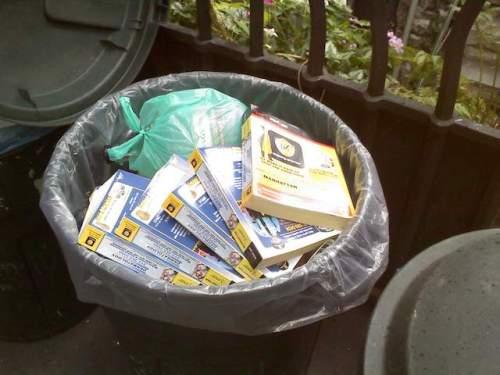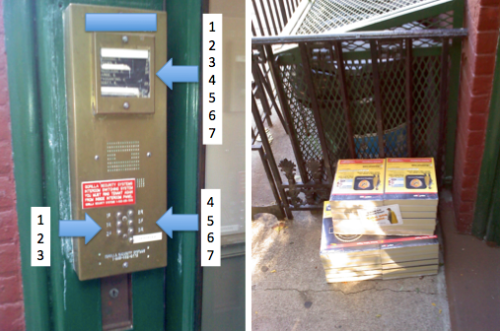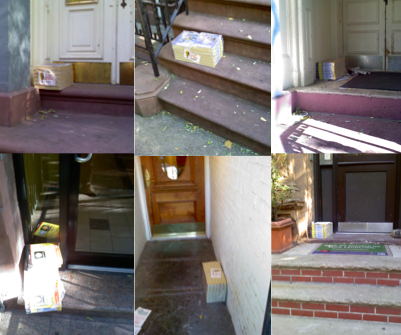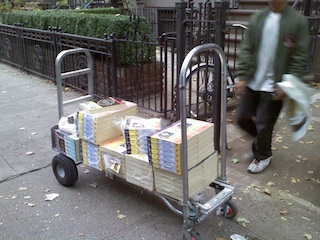If you read no further, just consider the picture below. It says it all.

This picture is worth the next 1,100 words. Get it?
Let me be clear about 3 things right off the bat:
1) As a marketer, I understand the need to promote goods & services
2) Having previously marketed media, I also understand the need to maximize reported distribution/coverage of a marketing vehicle so that it’s appealing to potential advertisers
3) I’m not one of those internet snobs that thinks nobody should be using phone books. Any consumer who finds them useful should get one, and any advertiser who finds them effective should benefit from this marketing vehicle.
Those things said, the distribution of Verizon phone books in Manhattan is an environmental waste, a burden on consumers who don’t want them, and a gross misrepresentation for the book’s advertisers.
Let me start with an analysis from my own small apartment building in lower Manhattan. There are 7 apartment units in this building, which is clear from the 7 buzzers & name labels by the building’s front door. Yet we’ve had a stack of 12 Verizon Yellow Pages books and 12 “Business to Business” directories by our front door for the last 4 days.

Fuzzy math: 7 apartments (and buzzers), but 24 phone books dumped on our building
Forgetting that nobody in my building has taken a single one of these in 4 days, let’s consider that even if *everybody* in the building took one of each of the two directories, there would *still* be a 42% waste factor.
And, why was a *single* B2B directory delivered on our 100% residential block? B2B, as explained on the directory’s cover, means “Business to Business.”
While walking to work yesterday, I took these pictures of stacks of directories in front of other buildings on my block. This was 3 days after they were distributed.

Day 3 after the phone book drop. See a pattern here?
So who’s to blame for all this? Surprise: it’s not really Verizon. In a nod to the migration to internet searching for phone numbers (not to mention the need to fund its heavy investment in FIOS infrastructure), Verizon spun off its phone book business in 2006 to Idearc.
Since the spin-off, Idearc’s revenue has fallen about 8% (but at $3B, this is still big business). The problem? Print directory advertising, representing 90% of Idearc’s total revenue, declined 10%. Its internet advertising, while growing quickly, is still too small of a base to make up the difference. Does this sound familiar? It’s exactly what’s happening (or happened) to other print vehicles like magazines and newspapers.
But the real problem was the crushing debt of $9B that Verizon dumped on Idearc, ultimately causing Idearc to file for Chapter 11 Bankupty earlier this year after it broke its debt covenants with creditors.
Now in restructuring, Idearc must be under incredible pressure to fix things fast and book as much Yellow Pages advertising as humanly possible. Think of the pressure on their ad salespeople.
Small business advertisers, the core of Yellow Pages revenue, are likely attracted by a couple of things that a decent Idearc ad salesperson would try to convey: 1) a promise of mass distribution of their message, and 2) the tangible ability to see that message themselves.
Verizon’s Yellow Pages plays into both of these needs. Idearc claims they have a distribution of 884,000 directories in Manhattan alone. If you’re a small business in Manhattan, that seems like an awful lot, right? And unlike internet ads or search advertising that may run “sometimes but not always”, it’s easy to verify your listing in the phone directory: just open the book, and there it is in black and yellow.
But if the experience on my block is any indication, Idearc is over-estimating the true distribution of their directories by a factor of perhaps 80-90%. That’s bad news for advertisers and even more unfortunate for the environment: in the best case, the unwanted directories will immediately go in the recycling bin. In reality though, many probably go straight into the garbage.
Ok, but there must be a way for consumers to say, “No thanks” to directory distribution, right? After all, we can opt out of email, as stipulated by federal CAN-SPAM laws. Well, yes and no.
Here’s a resource to find the printed directory distributors in your area, so you can call them to opt-out in the future. Idearc’s number is 800-888-8448 (select Option 2). I called them to opt-out and was connected in 15 seconds to a real person who promised to help.
Here’s the thing, though: there’s no way he could.
Did you notice anything in common with all the pictures of directories above? They are all shrink-wrapped in lots of 12. So even if 6 of the 7 apartments in my building had opted out of receiving the book, presumably we *still* would have had at least 12 dumped on us. (conversely, if they had broken open a pack to leave just one, it would have been soaked by this week’s rain)
It gets worse. Yesterday I came across the people who were distributing directories on the next block. It looked like a hard-working husband and wife team who were really hustling. To their credit, at one point I saw them debate among themselves whether to leave a stack in front of a brownstown that was clearly being gut-renovated, with only rafters showing and workers everywhere. At least there was some thought to that (they ultimately decided to skip the house).

The root of the problem: no way to truly opt out.
I approached these folks and politely asked them if they had a way to know who didn’t want to receive these directories. They explained that “we don’t leave one if someone says they don’t want it.” But when I asked if they received any kind of list in advance for people who didn’t want them, they said, “oh no, nothing like that.”
Bottom line: opting out does nothing because the actual distributors dump packs of 12 books on each doorstep, and they have no list of who might have opted out, anyway.
I guess the whole thing would be a big joke if it weren’t so wasteful for the environment, frustrating for consumers, and misleading for advertisers.
Here’s a funny video showing one creative way to return your unrequested phone book.
Some parting thoughts & resources:
- Idearc says that they will add opt-out capability on their website by the end of the year. -> Update: the form is now live. Whether it works or not is another issue.
- Idearc claims to have a total of 129 million copies of directories in circulation (out of an industry-wide 540 million total). That’s a lot of trees.
- Here’s an analysis of the spinoff of Verizon’s print directories from a former employee.
- An excellent look at this issue by Lea Bogdan at inhabitat.com.
- A facebook group called “Scrap the Phonebook“.
- I sent the following email to Idearc and received an automated acknowledgment but no answer to my question (yet). I’ll post an update if they do get back to me.
Hi Idearc:
I would like to permanently opt-out of receiving any of your printed directories. The other 7 tenants in my Manhattan residential apartment building would like to do the same.
How do we proceed, please?
Thanks in advance,
Kelly Ford
New York, NY 10011
(email sent 10/15/09)
Update: Dec 26, 2009:
Idearc Media dropped white pages last week on my block. Despite this blog post, despite my phone call to Idearc, despite Lisa Vilfordi’s comment here and subsequent direct emails between Lisa and me, despite Lisa’s personal assurances this would not happen again, they still screwed it up.
On the plus side, Idearc’s distributor dropped only the number of books which corresponded to the number of units/buzzers in my building: 7. But they didn’t honor my multiple opt-out requests. Assuming nobody else in my building had opted out, there should have been only 6 books dropped. So, assuming that all other 6 tenants in my building wanted, took, and used the books (which is a laughable set of assumptions), we’re still talking a 1/7 = 14+% waste factor.
I went on a trip out of town and came back 6 days later, and surprise: all 6 books were still there, now waterlogged. They all ended up in the garbage. Waste factor: 100%.
I sent an email to Lisa Vilfordi of Idearc to ask for her comment, but she didn’t reply.


Update: I received a one sentence email back from Idearc suggesting I call their 800 number. I’ve already done that.
Hi Kelly,
I work for Idearc Media, publisher of the Verizon Yellow Pages. Let me start off by saying that I agree with your post that directories should not be delivered this way and as you can see from our recent press release you referenced we are working on making the distribution process better.
Which includes:
— New language on our directory covers and Table of Contents/Emergency Numbers page: “To order directories or to stop delivery of this directory, call 1-800-888-8448”
— An online opt-out capability: By years end Idearc.com will have an opt-out tab
— Continuing to work with vendors to ensure directories are not delivered to empty houses or abandoned buildings
— Opt-out businesses and homes will receive a door-tag stating, “Our records show you have chosen to stop receiving the Verizon Yellow Pages. If this is incorrect please call 1-800-888-8448”
You mentioned the operator on our opt-out line could not help you, please send me an email with more details and I’ll help get to the bottom of it for you.
I also appreciated in your post that you acknowledge the phone book is a product some still find useful. I think you and your readers would agree that one book with a value would be…. well valuable. Problem is, over the last few years companies publishing the yellow pages spent all their time defending the book instead of differentiating it and creating something consumers would want.
We launched the SuperGuarantee program, a national consumer guarantee initiative, launched in February is designed to lower the risk associated with hiring contractors, plumbers, auto body repair shops and thousands of other eligible service provider category-based businesses.
In essence, consumers register for free, hire one of our guaranteed clients they find in the Verizon Yellow Pages or on http://www.superpages.com. If something goes wrong, we will step in and try to make it right. If we can’t, we will give the consumer up to $500.
We are working to be different – The Verizon Yellow Pages and Superpages.com are not the same old yellow pages.
Thank you for the opportunity to comment.
Lisa
Lisa,
Thanks for commenting. Based on what you write (and what the Idearc phone rep told me), the wasteful delivery issues in Manhattan seem to be more about poor execution rather than absence of a policy. Nevertheless, the immediate effect is the same, so I’d encourage you to explore ways to hold your 3rd party distributors/contractors more accountable.
Re: the SuperGuarantee program, I agree that this is a good step to create some meaningful differentiation and value for superpages.
Kelly
Tell Lisa and the folks at Idearc it is time to give up the thought that is is acceptable to distribute books in a manner that I would consider “Saturation Distribution”
They state:
“I also appreciated in your post that you acknowledge the phone book is a product some still find useful. I think you and your readers would agree that one book with a value would be…. well valuable. Problem is, over the last few years companies publishing the yellow pages spent all their time defending the book instead of differentiating it and creating something consumers would want.”
yet forget that the excuse that “Some” want the book is completely wasteful, retarded, and rude. If I don’t want a book don’t give me one. Your business model needs to cater to subscribers like all the other forms of media. This is why the industry has a shitty reputation. Folks HATE the yellow pages and the industry is what killed it! Idearc acts as though they have the RIGHT to send you a book. You can’t even get pissed off at Verizon for it now (used to be the excuse was that you had a phone line and they were required).
I find the argument from the PR folks at the company a funny one.
And good job copying Service Magic with the SuperGuarantee…… very original.
http://www.DallasGoogleGuru.WordPress.com Trying to create a bit of transparency regarding Local Search, Yellow Pages, and everything in between.
Cheers folks,
Mike Stewart
twitter.com/dallasSEOguru
Pingback: Bombing Apartments with Yellow Pages | The Deets
Pingback: Smart move by Yahoo to partner with Gannett for local sales « Bits of Kelly
The same problem exists in Colorado.
10/16/2009 .. “By years end Idearc.com will have an opt-out tab”
As of 8/23/10 .. it is a lie. No way to opt-out.